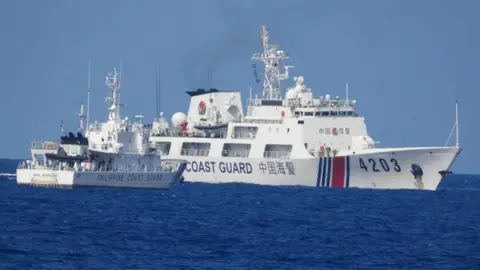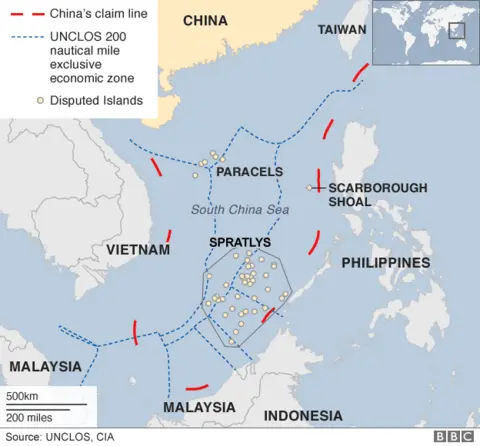Philippines accuses China of firing water cannon at boats in South China Sea
 Reuters
ReutersThe Philippine Coast Guard has accused its Chinese counterpart of firing water cannon at its vessels and blocking them in the disputed South China Sea.
It said this happened when its ship was escorting boats carrying supplies for Filipino soldiers stationed on one of the contested Spratly Islands.
The US condemned Beijing's "dangerous actions", also blaming Chinese "maritime militia" for the incident.
China has not publicly commented on the reported incident.
Beijing claims almost the entire South China Sea, including the Spratlys, which is also claimed in part by the Philippines.
There are also competing claims by Malaysia, Vietnam, Brunei and Taiwan.
In a statement, the Philippine Coast Guard (PCG) said the incident happened on Saturday as its vessels were heading to Second Thomas Shoal in the Spratly Islands.
It described China's actions as "excessive and unlawful", adding that they also violated international law.
Meanwhile, the US Department of State voiced its support for "our Philippine allies".
"Firing water cannons and employing unsafe blocking manoeuvres, PRC [China's] ships interfered with the Philippines' lawful exercise of high seas freedom of navigation and jeopardised the safety of the Philippine vessels and crew," the department said in a statement.
China ignores an international arbitration court's ruling that its claim to almost the entire South China Sea is ill-founded.
In April, a BBC team aboard a PCG ship witnessed Chinese harassment at first hand.
The South China Sea is now one of the world's biggest flashpoints, especially as US-China tensions have soared in recent years.
Access to these waters is key to defending Taiwan at a time when China's claims over the self-governed island have intensified.
The waterways also host $5tn (£4tn) of global trade every year, raising concerns that Beijing's increasing footprint could restrict commerce.

